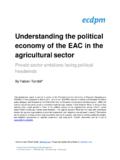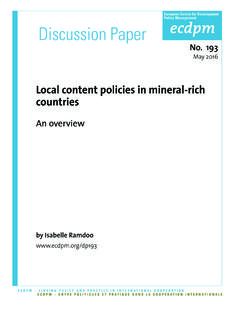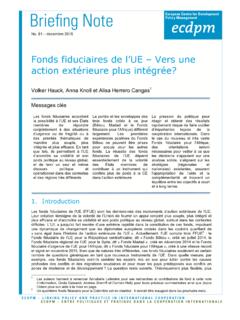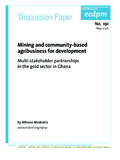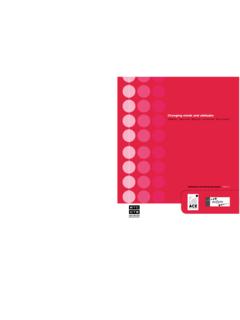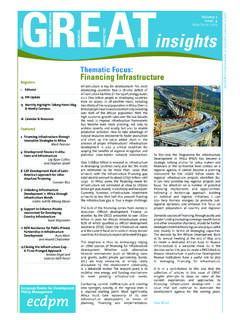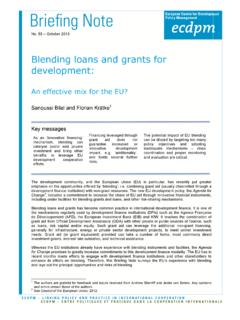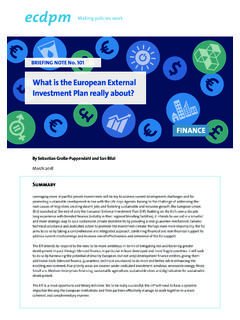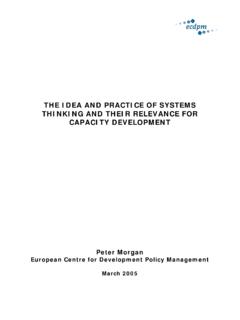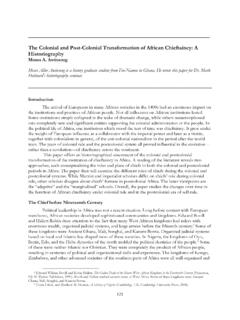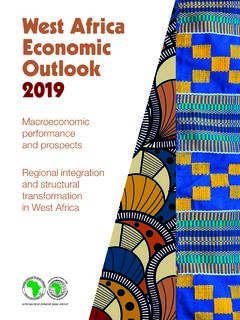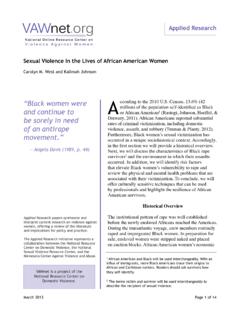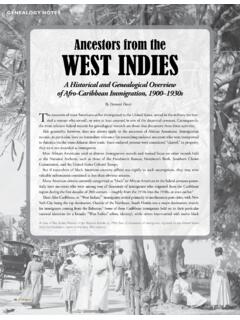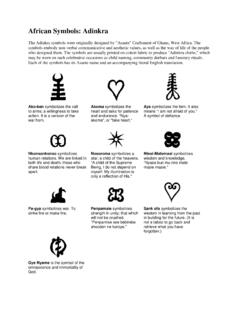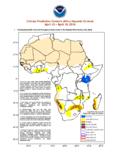Transcription of THE ECONOMIC COMMUNITY OF WEST AFRICAN STATES …
1 THE POLITICAL ECONOMY OF REGIONAL INTEGRATION IN AFRICATHE ECONOMIC COMMUNITY OF west AFRICAN STATES (ECOWAS)Jean Bossuyt Political economy of regional integration in Africa The ECONOMIC COMMUNITY of west AFRICAN STATES (ECOWAS) Report Jean Bossuyt January 2016 ECOWAS Study ECOWAS Member StatesBeninBurkina Faso Cape Verde C te d'IvoireGambiaGhana GuineaGuinea-Bissau LiberiaMaliNiger Nigeria Senegal Sierra LeonTogo MEMBER COUNTRIES: 15 ECOWAS Study Table of Contents Acknowledgements .. i!Acronyms .. ii!Executive Summary .. iv!1.!Introduction .. 1! !Why this study of the ECOWAS? .. 1! !Why a political economy analysis? .. 1! !Methodology of the study .. 2! !Scope and structure of the ECOWAS analysis .. 4!2.!General ECOWAS features .. 5! !Foundational factors.
2 6! !Institutional factors, actors and incentives .. 9! !Inter-regional dynamics .. 14! !External factors .. 15! !Cross-cutting issues: Gender .. 16!3.!ECOWAS in the area of peace and security and governance .. 18! !Sector characteristics .. 18! !ECOWAS and the conflict in Mali .. 20! !ECOWAS and the political crisis in Ivory Coast and Burkina Faso .. 27! !Conclusion .. 34!4.!The role of ECOWAS in food security .. 36! !Food security in west Africa .. 37! !The domestication of CAADP and ECOWAP policies in Burkina Faso .. 39! !Regional food security and the private sector the case of rice and livestock .. 45!5.!Final conclusions .. 52! !Key findings .. 52! !Implications .. 54!Bibliography .. 56!Annex 1: List of interviews .. 58! List of Boxes Box 1: Key phases of the process and related policy responses.
3 22!Box 2: Main bottlenecks and challenges in the rice sector .. 38!Box 3: Key private sector players in the ECOWAS region .. 46!Box 4: Changes in Nigeria s trade policies with a view to safeguard the effectiveness of national rice strategies .. 47!Box 5: The rice producers and collective action around the Common External Tariff (CET) .. 50! ECOWAS Study List of Figures Figure 1: Distribution of the 2010 budget for the Programs of the ECOWAS Commission per departments .. 12!ECOWAS Study i Acknowledgements This study is part of a broader project analysing the political economy of the AFRICAN Union and Regional ECONOMIC Communities in Africa. It is funded by the Embassy of Sweden in Nairobi. The authors acknowledge this support, as well as the contributions from the AFRICAN and European experts, the peer reviewers, the Swedish Quality Assurance Group, and of course the many AFRICAN partners who dedicated time and shared their insights and wisdom.
4 This study was coordinated by Jean Bossuyt. Jean Bossuyt was the lead author of the ECOWAS report, with contributions from Anna Knoll and Sophie Desmidt (authors of the peace and security section related to ECOWAS in the Mali crisis), Zakaria Amar (who contributed to the section on unconstitutional changes of government) as well as Fabien Tondel, Carmen Torres and Roger Blein (who carried out the studies on agriculture and food security). Stella Sabiiti participated as AFRICAN expert in the mission to ECOWAS Headquarters. The authors of this study are responsible for its content, interpretations and any errors. ECOWAS Study ii Acronyms AFAN AFISMA AQIM APF APESS APSA ASF ATT ASSN AU BRICS CAADP CEEAC/ECCAS CEMAC CET CILSS CIR-B COFENABVI COMESA CRCOPR CSO FAO FARE EAC ECCAS/CEEAC ECCJ ECOMICI ECOMOG ECOWADF ECOWAP ECOWARN ECOWAS ECOWEP ECPF EDF EGDC EPA EPF ESF ETLS EU GDP ICBT IFPRI All Farmers Association of Nigeria AFRICAN -led International Support Mission to Mali Al Qaeda in the Maghreb AFRICAN Peace Facility Association des pasteurs leveurs du Sahel et de la Savane AFRICAN Peace and Security Architecture AFRICAN Standby Force President Amadou Toumani Tour AFRICAN Security Sector Network AFRICAN Union Brazil, Russia, India, China.
5 South Africa Comprehensive Africa Agriculture Development Programme Communaut conomique des tats de l' Afrique Centrale Central AFRICAN ECONOMIC and Monetary COMMUNITY Common external tariff Comit Permanent Inter- tats de Lutte contre la S cheresse dans le Sahel Comit Interprofessionnel du Riz du Burkina Confederation of National Federations of cattle-meat Common Market for Eastern and Southern Africa Cadre R gional de Concertation des Organisations de Producteurs de Riz Civil Society Organisation Food and Agriculture Organisation Forum of Associations Recognized by ECOWAS East AFRICAN COMMUNITY ECONOMIC COMMUNITY of Central AFRICAN STATES ECOWAS COMMUNITY Court of Justice ECOWAS mission in Cote d'Ivoire ECOWAS Ceasefire Monitoring Group ECOWAS Fund for Agriculture and Food ECOWAS Agricultural Policy ECOWAS Early Warning and Response Network ECONOMIC COMMUNITY of west AFRICAN STATES ECOWAS Environmental Policy ECOWAS Conflict Prevention Framework European Development Fund ECOWAS Gender Development Centre ECONOMIC Partnership Agreement ECOWAS Peace Fund ECOWAS Standby Force ECOWAS Trade Liberalisation Scheme European Union Gross Domestic Product Informal cross border trade International Food Policy Research Institute ECOWAS Study iii IGAD IMF ISS LDC MARWOPNET MICEMA MINUSMA MSC MUJAO NAIP NEPAD NGO NRDS OECD PAPS PNSR PREAO PSC RAFA RAIP RECs RIFAN ROPPA SADC TCC UOFA UEMOA/WAEMU UN UNOCI WAEMU/UEMOA WANEP Intergovernmental Authority on Development International Monetary Fund Institute for Security Studies
6 Least developed countries Mano River Women Peace Network ECOWAS Mission in Mali UN Multidimensional Integrated Stabilization Mission in Mali Mediation and Security Council Movement for Unity and Jihad in west Africa National Agricultural Investment Plan New Partnership for Africa s Development Non-Governmental Organisation National Rice Development Strategy Organisation for ECONOMIC Co-operation and Development Political Affairs, Peace and Security Programme national du secteur rural ECOWAS Water Resources Policy Peace and Security Council Regional Agency for Food and Agriculture Regional Agricultural Investment Plan Regional ECONOMIC Communities Rice Farmers Association of Nigeria R seau des Organisations Paysannes et de Producteurs de l Afrique de l'Ouest Southern AFRICAN Development COMMUNITY Troop Contributing Countries Union des Organisations de la Fili re Avicole Union conomique et mon taire ouest-africaine United Nations United Nations Operation in C te d'Ivoire west AFRICAN ECONOMIC and Monetary Union west Africa Network for Peace building ECOWAS Study iv Executive Summary This study presents a political economy analysis of the ECONOMIC COMMUNITY of west
7 AFRICAN STATES (ECOWAS), focusing in particular on what drives and hampers this regional organisation in preventing and resolving conflicts in west Africa, and in promoting a regional approach to agriculture and food security. The report is part of a broader study that includes the AFRICAN Union and four other Regional ECONOMIC Communities in Africa. Why a political economy study of ECOWAS? The ECONOMIC COMMUNITY of west AFRICAN STATES (ECOWAS) was established in 1975 with the formal aim of promoting ECONOMIC co-operation between 15 countries with different historic trajectories (colonisation, language, and administrative cultures) yet sharing similar socio- ECONOMIC conditions. During the 1980s the regional body was confronted with a large number of political crises, ranging from civil war to various military or constitutional coups d tat.
8 This forced ECOWAS to fully embrace the security agenda as a core business . The region is widely recognised as a trailblazer, including for the AFRICAN Peace and Security Architecture (APSA). Several crises have been effectively addressed through regional diplomacy and military intervention. Over the years, ECOWAS has sought to promote an ever-widening regional integration agenda through a wide variety of strategies, action plans and programmes. Initially the regional body functioned through a state-centric, top-down approach to promoting regional integration. From the 1990s onwards, there were deliberate attempts by ECOWAS to also spur regional dynamics from below through close collaboration between institutional actors, civil society and business organisations.
9 ECOWAS recently celebrated its 40th Anniversary. In reviewing the track record of the organisation, most analyses concur that important achievements were obtained in different domains, including restoring peace, containing conflicts, dealing with rigged elections, facilitating the free movement of people or supporting infrastructure development (trans-coastal and trans-Sahelian roads). Yet there is also a broad recognition that the initial aspirations have not been met. Overall progress in the actual implementation of ECOWAS policies in core areas such as trade, ECONOMIC and monetary cooperation, energy and social development has been limited. There are still many obstacles to the free circulation of people (such as the existence of numerous check points, arbitrary and discriminatory treatment of citizens of other countries, migration laws) and goods (including the non-application of the ECOWAS Trade Liberalization Scheme, illegal tariff barriers, and non-tariff barriers).
10 Other urgent crises remain unaddressed. The Sahel is being increasingly destabilised by cross-border crime, drug trafficking, the Tuareg conflict, terrorism and the spread of Al Qaeda in the Islamic Maghreb. The envisaged transition in the Vision 2020 from an ECOWAS of STATES to an ECOWAS of People has still a long way to go, particularly in terms of delivering tangible outcomes for citizens. However, in assessing the performance of ECOWAS one cannot ignore the particularly harsh political, institutional and socio- ECONOMIC conditions in which the integration project had to be pursued. The region ranks particularly low regarding all human development indicators. Thirteen ECOWAS countries are classified in the low Human Development category and 60 per cent of the population is estimated to live on less than one dollar a day.

